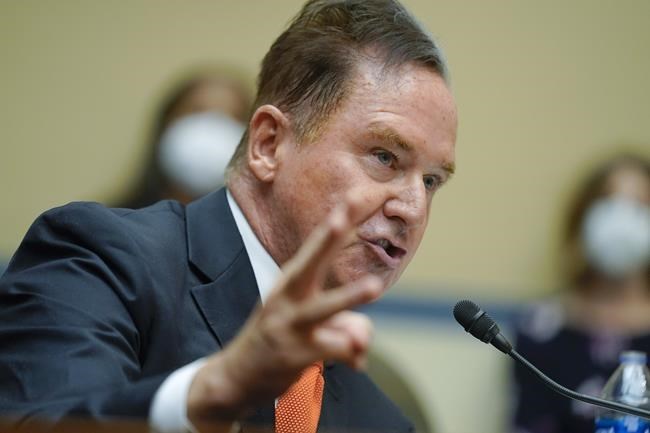WASHINGTON — The federal government is giving in to the same nationalist impulses it has been fighting for years in the United States, say critics on both sides of the border who oppose Ottawa's new push to discourage foreigners from owning Canadian real estate.
The deadline to pay a new one per cent property tax aimed at foreign-born, non-resident homeowners is coming in April and leaving a bitter taste in the mouths of some Americans who own vacation homes in Canada.
The so-called underused housing tax is coming due alongside a new two-year ban on foreign-owned real estate that took effect in January, a federal response to long-standing concerns that non-resident speculators are driving up housing prices.
It all adds up to an insult and an affront to the values that are supposed to define the unique Canada-U.S. relationship, said John LaFalce, a former New York congressman who bought a cottage in Fort Erie, Ont., after retiring in 2003.
"It's a hostile act," LaFalce said in an interview. "It's a xenophobic act. And it's certainly not the type of act that becomes people in countries who consider themselves best friends."
And it's not coming out of the blue, said Fort Erie town councillor Nick Dubanow, who has noticed a gradual breakdown in the traditionally seamless links between his community and those on the other side of the border.
Nothing has been the same since the COVID-19 pandemic brought cross-border traffic to a standstill in 2020, Dubanow said, citing the challenges property owners faced in getting across to check on their vacation homes even after travel restrictions began to ease.
Now, the federal government's measures — first the tax, now the ownership ban — feel like insult on top of injury.
"It's almost like a kick in the stomach," Dubanow said.
"Not to say we were joined at the hip, but we always had a common goal and a common outlook on the North American economy, the movement of goods, the movement of people. It seems like that's changed. And it's almost like we're going on our own paths."
The restrictions are aimed primarily at properties that lie inside regions with populations of 10,000 people or more, based on census data. Fort Erie is deemed part of the census metropolitan area of nearby St. Catharines, Ont., while properties in Port Colborne, a lakeside community just 20 kilometres away, would be exempt.
And Dubanow said he's confident that the measures will actually have the opposite effect on home prices, since he expects would-be buyers from Toronto are likely to fill the space created by banning owners from western New York.
"These cottages have been owned by generations of families from western New York," he said.
"They're probably going to sell, and it's going to end up being sold to someone from Toronto who's going to jack up the price to double what it would have been if it was sold to another western New Yorker."
For his part, LaFalce said he has no plans to sell.
"I can afford to pay the taxes, that's not a big problem. It's really the principle of the thing," he said. "I'm just offended by the fact that I must sell it to a Canadian if I want to sell, at least within the next two years."
New York Rep. Brian Higgins, long an outspoken voice on Canada-U.S. border issues, particularly during the pandemic, is trying to enlist senior Biden administration officials to go to bat for affected American homeowners.
Higgins has written to ask U.S. Secretary of State Antony Blinken to officially object to the new underused housing tax, as well as to U.S. Trade Representative Katherine Tai, citing it as a violation of the U.S.-Mexico-Canada Agreement.
He also buttonholed Kirsten Hillman, Canada's ambassador to the U.S., at a recent event to register his opposition to the measures.
"Canada probably feels like it's been knocked around a little bit," said Higgins, acknowledging the hit the bilateral relationship took while Donald Trump was in the White House.
But President Joe Biden, who is due to visit Canada for the first time as president next month, has taken steps to shore up the ties between the two countries, Higgins said. Prime Minister Justin Trudeau was the first foreign leader Biden called after becoming president, a consolation prize of sorts at a time when travel was still verboten due to COVID-19, he noted.
"I think the overriding issue in all of this — and this is why it's essential — is that whatever problems exist, let's work them out and move forward, because we need each other. And the changing dynamic of the global economy just reinforces that."
In his letter to Blinken, Higgins said the policy runs counter to what Canada and the U.S. ought to be doing to resurrect cross-border commerce as the two countries continue on the path toward a post-pandemic recovery.
"This is an unnecessary burden and bad-faith action by the government of Canada which violates the (USMCA), as well as long-standing tax treaties," he wrote.
He wants Blinken to ensure it comes up next month when Biden and Trudeau meet in person.
"This tax will impose a burden, financially and bureaucratically, on hardworking Americans who in many cases have owned these properties for generations," the letter reads. The available exemptions to the new levy don't go far enough, he added.
"The United States and Canada share a unique relationship, but imposing the underused housing tax is concerning and threatening to it and must be addressed in upcoming bilateral meetings."
This report by The Canadian Press was first published Feb. 16, 2023.
James McCarten, The Canadian Press
Note to readers: This is a corrected story. An earlier version used an incorrect last name for John LaFalce.




